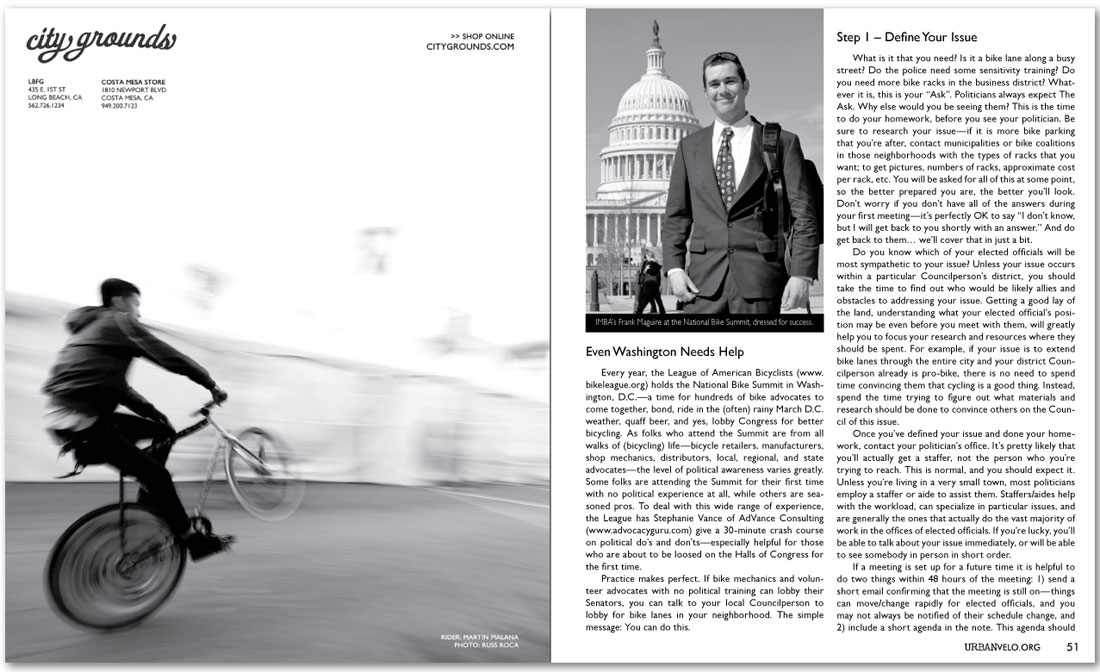|
Even Washington Needs Help
Every year, the League of American Bicyclists (www.bikeleague.org) holds the National Bike Summit in Washington, D.C.—a time for hundreds of bike advocates to come together, bond, ride in the (often) rainy March D.C. weather, quaff beer, and yes, lobby Congress for better bicycling. As folks who attend the Summit are from all walks of (bicycling) life—bicycle retailers, manufacturers, shop mechanics, distributors, local, regional, and state advocates—the level of political awareness varies greatly. Some folks are attending the Summit for their first time with no political experience at all, while others are seasoned pros. To deal with this wide range of experience, the League has Stephanie Vance of AdVance Consulting
(www.advocacyguru.com) give a 30-minute crash course on political do’s and don’ts—especially helpful for those who are about to be loosed on the Halls of Congress for the first time.
Practice makes perfect. If bike mechanics and volunteer advocates with no political training can lobby their Senators, you can talk to your local Councilperson to lobby for bike lanes in your neighborhood. The simple message: You can do this.
Step 1 – Define Your Issue
What is it that you need? Is it a bike lane along a busy street? Do the police need some sensitivity training? Do you need more bike racks in the business district? Whatever it is, this is your “Ask”. Politicians always expect The Ask. Why else would you be seeing them? This is the time to do your homework, before you see your politician. Be sure to research your issue—if it is more bike parking that you’re after, contact municipalities or bike coalitions in those neighborhoods with the types of racks that you want; to get pictures, numbers of racks, approximate cost per rack, etc. You will be asked for all of this at some point, so the better prepared you are, the better you’ll look. Don’t worry if you don’t have all of the answers during your first meeting—it’s perfectly OK to say “I don’t know, but I will get back to you shortly with an answer.” And do get back to them… we’ll cover that in just a bit.
Do you know which of your elected officials will be most sympathetic to your issue? Unless your issue occurs within a particular Councilperson’s district, you should take the time to find out who would be likely allies and obstacles to addressing your issue. Getting a good lay of the land, understanding what your elected official’s position may be even before you meet with them, will greatly help you to focus your research and resources where they should be spent. For example, if your issue is to extend bike lanes through the entire city and your district Councilperson already is pro-bike, there is no need to spend time convincing them that cycling is a good thing. Instead, spend the time trying to figure out what materials and research should be done to convince others on the Council of this issue.
Once you’ve defined your issue and done your homework, contact your politician’s office. It’s pretty likely that you’ll actually get a staffer, not the person who you’re trying to reach. This is normal, and you should expect it. Unless you’re living in a very small town, most politicians employ a staffer or aide to assist them. Staffers/aides help with the workload, can specialize in particular issues, and are generally the ones that actually do the vast majority of work in the offices of elected officials. If you’re lucky, you’ll be able to talk about your issue immediately, or will be able to see somebody in person in short order.
If a meeting is set up for a future time it is helpful to do two things within 48 hours of the meeting: 1) send a short email confirming that the meeting is still on—things can move/change rapidly for elected officials, and you may not always be notified of their schedule change, and 2) include a short agenda in the note. This agenda should
continued |
|
|
|

